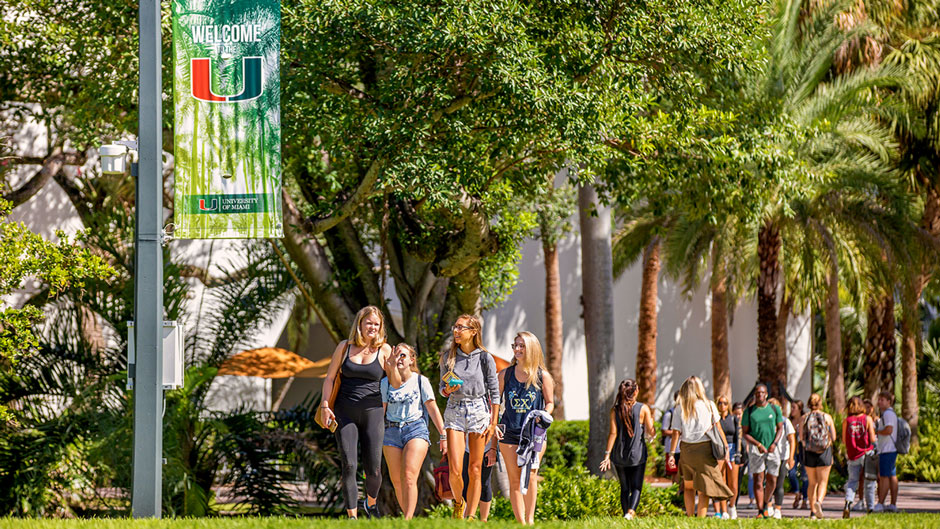Despite an unusual year for education around the globe as the coronavirus pandemic continued, the University of Miami reported a slight increase in student retention rates for the past year. In addition, support and services were also expanded to further improve the transfer student experience.
Currently, the University’s 97.6 percent fall to spring retention rate among first-year, full-time degree-seeking students showed an upward trend compared to the pre-COVID rate of 96.9 percent for the 2019-20 school year. University leadership confirms that these numbers reflect students’ continued trust and confidence in the quality of education they are receiving, as well as faculty and staff members’ commitment to student success.
“We are so fortunate to recognize that if our students have the choice of learning from their hometown, relegated to suboptimal learning conditions, or being at the University of Miami, a lot of them chose to be at the University,” said Jeffrey Duerk, executive vice president for academic affairs and provost. “They didn’t do that to have fun, they came to get educated, and we delivered on that.”
Administrators attribute the bump to a number of factors, including widespread classroom safety protocols and a robust testing, tracing, and tracking program that allowed the University to offer hybrid and in-person instruction throughout the 2020-21 academic year. In addition, campus leaders conclude that new programs added within the past few years have affirmed students’ decision to stay at the U.
Launched in 2019, first-year directions courses are offered for new students through their individual school or college. These classes support students with their transition to college and help them identify their own strengths, while also introducing them to campus resources and building a foundation for their four-year graduation plan. The courses have grown in popularity each year, said Darby Plummer, director of student retention at the University. Although just two sections were offered in 2019—at the School of Education and Human Development and at the College of Engineering—this August there will be 54 sections of first-year directions offered in six different schools and colleges.
“From the fall that we launched it to a year later, 97 percent of the students who attended these classes stayed at UM,” Plummer said, adding that student feedback has been positive. “We were really encouraged by that. The whole purpose of the course is to get students connected to each other and connected to their school and the campus.”
Plummer also credits the University’s stronger retention rates to some other programs her office, the ’Cane Success Center, has worked with campus partners to create. One is GPAid, which focuses on supporting students who are struggling academically after their first semester. The ’Cane Success Center, in partnership with academic advisors in each individual school or college and the Camner Center for Academic Resources, utilizes the GPAid program to help students hone time management, note-taking, and study skills, as well as to help them understand the academic policies available to minimize any long-term impacts from a rocky start to college.
“We know some students just have a harder transition than others, so this program allows them to self-reflect about what got in their way and guides students toward the academic tools they have at the University to reach their potential,” Plummer said. “Sometimes students don’t realize they need to be very intentional about making changes. But we are working to make sure students are aware of this free program and that they opt in,” she added.
“I believe everything a student needs exists here at UM, but sometimes students don’t know how they work together,” Plummer continued. “We want them to have that information, and we hope this will get students started on the right foot.”
In addition, starting last fall, the Office of the Provost partnered with the Department of Orientation and Commuter Student Involvement, housed within the Division of Student Affairs, along with the Division of Enrollment Management to offer transfer students specific sections of the first-year directions course.
As a result, staff members across the Coral Gables Campus now work daily to advise and support transfer students—those who were previously enrolled at a community college, another four-year institution, or the military. And they make up 18 percent of the undergraduate student population.
“I was a transfer student myself, so I understand how crucial it is to feel connected to your university,” said Duerk. “I believe these programs will help our transfer and commuter students acclimate even more effortlessly. They are a vital part of our ’Canes community.”
Michael Baumhardt, director of orientation and commuter student involvement, and his department lead efforts to ensure transfer students are thriving as they transition at the University. He credited the recent first-year directions collaboration, along with his department’s current programs and services, as being key to transfer students’ positive experience.
Upon enrolling, students are assigned transfer assistants, or student leaders who serve as a mentor and resource to transfer students throughout their academic careers. This summer, the University’s newest transfer students have the option of both in-person and virtual transition programs such as Great Start, ’Canes Connect, and the Road to UM: LIVE Summer Series.
“I don’t think everyone always realizes how important and large this population is at the University. We always strive to provide a high level of support, programming, and mentoring for our transfer students,” Baumhardt said.

